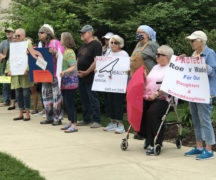Last year, lawmakers passed legislation allowing Ohioans to carry of an array of concealed, non-firearm weapons like butterfly knives, switchblades, springblades and billy clubs.
On Wednesday, the Senate passed legislation ensuring that Ohio’s cities don’t try to pass legislation on the local level that would limit this newfound right.
Current law, enacted earlier this year, allows for the manufacturing, sale and possession of brass knuckles, cestuses, billy clubs, blackjacks, sandbags, switchblade knives, springblade knives, gravity knives, and similar weapons.
Senate Bill 156, a form of so called “preemption” legislation, blocks cities from enacting any laws related to transporting possessing, carrying, selling, transferring, buying, gifting or using a knife.
The legislation passed the Senate in a 23-7 vote along party lines, with Republicans in support and Democrats in opposition.
The bill’s sponsor, Sen. Kristina Roegner, R-Hudson, said in committee the legislation “builds upon” the knife rights legislation passed last year. She said it averts a “confusing” patchwork of laws where a knife or sword might be legal for concealed carry in one city but illegal in the next. She said some of these weapons, like boxcutters, are work tools, and the law shouldn’t prohibit workers from pocketing them.
A similar “preemption” law exists on the book for guns in Ohio, which has for years blocked cities from imposing any legislation to limit gun sales or possession within their borders. Earlier this year, an appellate court ruled Cincinnati had no right, under the preemption law, to enact legislation that prohibited the use of “bump stocks” — attachments to rifles that increase their rate of fire.
Earlier this year, Gov. Mike DeWine signed similarly structured legislation blocking cities from banning or limiting new natural gas hookups. Lawmakers also slipped into the state budget legislation that prevents cities from taxing the use of disposable plastic bags.
The legislation is vulnerable to a challenge under the Home Rule Amendment to the Ohio Constitution, which generally grants cities the rights to self-govern, according to the Legislative Service Commission, a nonpartisan body that analyzes policy for lawmakers.
Republicans rebuffed the concern and passed the bill, which now goes to the House for consideration.
***
Also from Ohio Capital Journal:
Ohio representatives file new anti-trans bill, targeting health care providers
Ohio House lawmakers are running back a fight over trans youth in the state. But this time, instead of focusing on school sports, the proposal would prohibit offering minors any kind of gender affirming treatment — from hormones to surgery. The measure, H.B. 454, puts the onus on health care providers by defining that treatment as “unprofessional conduct” for state licensing boards, and making “actual or threatened violations” of the bill grounds for a lawsuit.
Erin Upchurch, executive director of Columbus’ Kaleidoscope Youth Center, calls the bill dehumanizing.
“I feel frustrated and angry and extremely disappointed that people who were voted into office to protect all Ohioans are using their platform and their power to actually attack a really specific portion of our communities,” she said. “It is a gross misuse of power and completely an overreach.”
The bill’s sponsors, Rep. Gary Click, R-Vickery, and Diane Grendell, R-Chesterland, begin by enumerating a series of legislative findings—a laundry list of dubious assertions meant to cast doubt on trans identities and the safety of medical procedures. READ MORE
Coalition rallies at Statehouse, demands redistricting hearings
The Equal Districts Coalition held a rally on the Ohio Statehouse steps on Wednesday, calling for public hearings on congressional redistricting maps that they said should have already been held by the official Ohio Redistricting Commission.
“The lack of leadership to follow through with the will of the people is troubling to say the least,” said Chris Tavenor, a staff attorney for the Ohio Environmental Council, one of the members of the coalition.
The coalition asked for public hearings from the official commission, which have yet to be scheduled, but they plan to have their own virtual public hearings on Thursday and Oct. 25 and 26.
The official redistricting commission has until the end of the month to approve a map. If they fail to do so, the process heads back to the legislature. — Susan Tebben, OCJ





